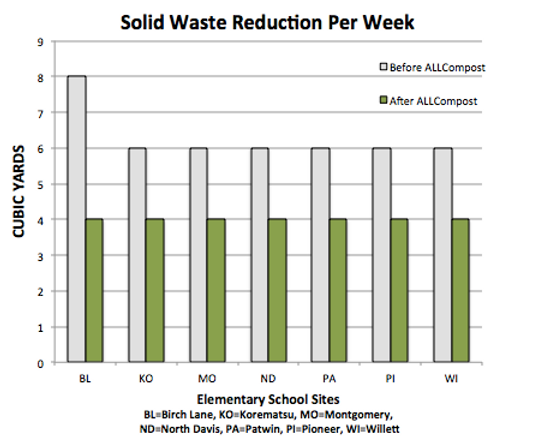top of page

DAVISRISE
School Composting



Recycling is Simply Elementary
HISTORY OF THE ORGANICS PROGRAM (Formally the ALL Compost Program)
In May 2011, the City of Davis and Davis Waste Removal (DWR) piloted a commercial food scrap collection program with local restaurants. Later that year, Cesar Chavez Elementary (CCE) and Harper Jr. High were invited to join the pilot program. The program was named ALL Compost for All Lunch Leftovers. In May 2016, the compost program will be mandated City-wide and will include the school district.
The Organics program accepts all food waste including meat, dairy, and bones; also napkins, paper towels, and school milk/juice cartons. Also accepted are the coated paper milk and juice cartons that come with the school hot lunch program.
The pilot program proved successful at the elementary level. The CCE pilot resulted in a one-third reduction of solid waste (estimated 480 cubic yards) per year at a cost savings to the district of $3,000 per year. Links below show documentation of pilot results. Because of the pilot’s success, the program was expanded in 2012 to all elementary schools. However, the program proved too challenging to manage at the secondary school level.
HOW IT WORKS
DWR provides dedicated 95 or 65 gallon compost containers to all school sites. There is a charge for each compost container. The compost containers are picked up once a week by special trucks on a schedule that is different from the garbage and recycling pickups.
DavisRISE Site Leaders and custodians set up the lunch sorting stations to incorporate the compost diversion. All food waste, including meat, dairy and bones can be placed in the organics containers. Lightly coated paper milk and juice cartons can also be added to the containers. Other paper products not suitable for paper recycling, such as wet paper towels from bathrooms, can also go into compost.
As with recycling and trash, custodians are responsible for moving compost containers to the pickup site on the designated day. It is best practices to keep containers in a cool place and with lids closed to prevent fly growth (see below).
CHALLENGES
The Organics Program differs from recycling in that there is a per-cart charge for schools to participate. Therefore, for the program to be cost-effective, the previous fee for removing recyclables and organics must be reduced enough to cover the new cost of hauling the organics.
In general, school waste reduction has suffered since 2012 because of changes in the National School Lunch program that require students to take a greater (albeit healthier) selection of items, especially fruit and vegetables. Unfortunately, students are discarding more uneaten food than before, which then overwhelms the compost collection capacity of the school site. DavisRISE continues to work with the district Student Nutrition Services and our other partners to meet this challenge.
Another challenge is the management of fly maggots in the organics carts. Davis’ late summer to early fall temperatures can be quite warm, which accelerates the breeding speed of the flies. Keeping the cart lid closed as much as possible, storing the containers in a cool location, and thoroughly cleaning containers after dumping helps to control the fly population until temperatures begin to cool and naturally slow down the flies’ life cycle.
Read more about the fly issue here.
Anchor 1
Pilot study timeline



Reduction in Cost
bottom of page